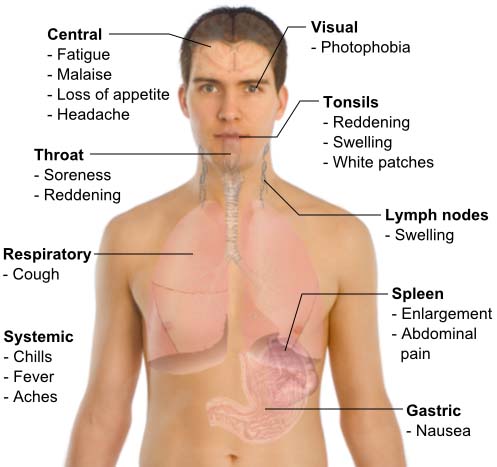Glandular Fever: Symptoms, Causes
and Treatment
As its name suggests, it is an illness in which the patient initially has some degree of fever and generally some enlargement and tenderness in the glands of the neck, and probably in the armpits and groin. It is an infectious disease and more apt to affect children and young adults. More often than not children appear to take it lightly, but it can sometimes cause young adults to be quite ill for several weeks.
Most frequently glandular fever starts with a sore throat occasionally accompanied by that sensation of aching tiredness that so often accompanies flu. The sore throat may not last more than a week, and there can also be a rash during this stage and quite high temperature. This raised temperature seldom lasts long in children, but again with young adults, though the temperature may not remain as high as at the start, it can sometimes linger on for a few weeks. In the more severe cases there can be abdominal discomfort, enlargement of the spleen and even jaundice if the liver has been affected.
Glandular fever is caused by the Epstein-Barr virus. This can attack only two types of cells in the body: those in the salivary glands and white blood cells known as B lymphocytes (B-cells). Infection begins in the salivary glands, which release large amounts of the virus into the saliva. The infection spreads to the B lymphocytes, causing them to multiply, and causing the lymph glands to swell and become painful. Once infected, the virus remains dormant in the body's cells for the rest of a person's life.
Naturally, from the onset, regular medical attention is needed. The doctor will probably take blood tests for pathological examination, first to confirm the diagnosis and then to follow the progress towards recovery.
Since glandular fever is a viral infection, there's no specific treatment. Pain relief and fever treatments (including paracetamol or ibuprofen), fluids and rest are important to help overcome the infection. Antibiotics aren't needed and can trigger a rash in this condition.
Because of the lingering-on tendency in some patients, glandular fever can be a very tedious illness for the patient, during both the feverish period and convalescence. And occasionally for some months after, it can leave a legacy of bouts of depression and unusual tiredness. During these aftermath months many doctors advise young adults to avoid all forms of alcohol. Those who decide to ignore this advice often discover that, as a result, they feel quite ill again. Fortunately, this stage is seldom long-lasting and generally a full recovery is made.
Glandular fever has an unofficial name — the 'kissing disease'. Probably this has come about since the illness so often occurs in young people and is an infection that can be contacted by kissing someone who may be unwittingly harboring the illness but perhaps is not feeling quite ill enough to miss a good party!
Main Symptoms of Glandular Disease:

|